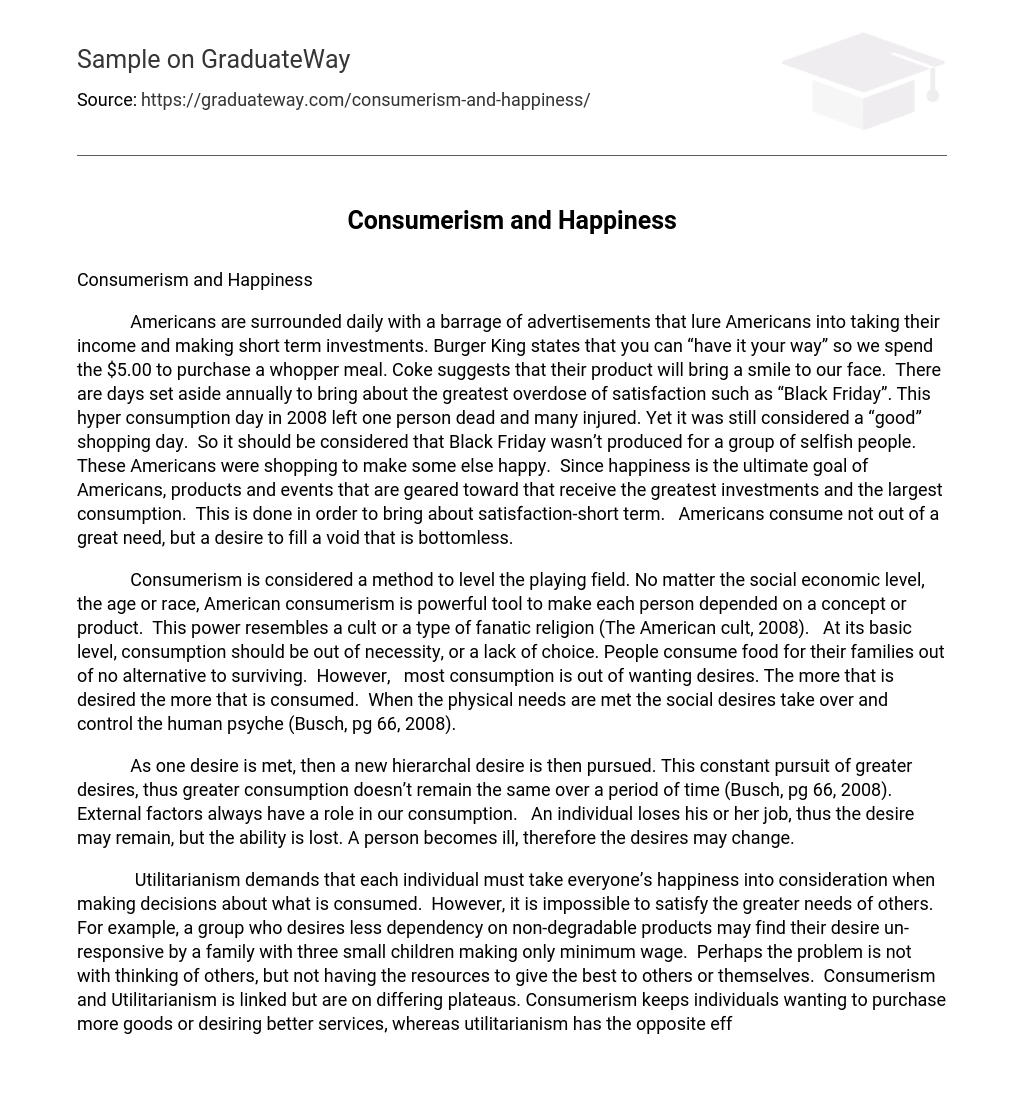Americans are surrounded daily with a barrage of advertisements that lure Americans into taking their income and making short term investments. Burger King states that you can “have it your way” so we spend the $5.00 to purchase a whopper meal. Coke suggests that their product will bring a smile to our face. There are days set aside annually to bring about the greatest overdose of satisfaction such as “Black Friday”. This hyper consumption day in 2008 left one person dead and many injured. Yet it was still considered a “good” shopping day. So it should be considered that Black Friday wasn’t produced for a group of selfish people. These Americans were shopping to make some else happy. Since happiness is the ultimate goal of Americans, products and events that are geared toward that receive the greatest investments and the largest consumption. This is done in order to bring about satisfaction-short term. Americans consume not out of a great need, but a desire to fill a void that is bottomless.
Consumerism is considered a method to level the playing field. No matter the social economic level, the age or race, American consumerism is powerful tool to make each person depended on a concept or product. This power resembles a cult or a type of fanatic religion (The American cult, 2008). At its basic level, consumption should be out of necessity, or a lack of choice. People consume food for their families out of no alternative to surviving. However, most consumption is out of wanting desires. The more that is desired the more that is consumed. When the physical needs are met the social desires take over and control the human psyche (Busch, pg 66, 2008).
As one desire is met, then a new hierarchal desire is then pursued. This constant pursuit of greater desires, thus greater consumption doesn’t remain the same over a period of time (Busch, pg 66, 2008). External factors always have a role in our consumption. An individual loses his or her job, thus the desire may remain, but the ability is lost. A person becomes ill, therefore the desires may change.
Utilitarianism demands that each individual must take everyone’s happiness into consideration when making decisions about what is consumed. However, it is impossible to satisfy the greater needs of others. For example, a group who desires less dependency on non-degradable products may find their desire un-responsive by a family with three small children making only minimum wage. Perhaps the problem is not with thinking of others, but not having the resources to give the best to others or themselves. Consumerism and Utilitarianism is linked but are on differing plateaus. Consumerism keeps individuals wanting to purchase more goods or desiring better services, whereas utilitarianism has the opposite effect. When our desire changes from objects to people, happiness comes from a different direction. Thus people are not depended on an object to make them happy, but the outward need to make others happy.
It seems that the shift in desire to help others only comes after major changes. People do daily find happiness in helping others, but only when large scale disaster strikes, do people forgo their immediate desires and extend help to others. Utilitarianism must be taught and constantly developed in others. It is not natural social behavior. People do not natural think of others first or their happiness. Consumerism only feeds the need or addiction, utilitarianism is the antidote to that addiction. It can work to keep people consuming but in a more responsible manner by ultimately desiring the needs of others.
Work Cited
Derakhashani, Tirdad. “The American cult of consumerism.” Philly.com. 21 Dec. 2008 <http:// www.printhis.clickability.com.html.>
Busch, Michael. “Adam Smith and Consumerism’s Role in Happiness: Modern Society Re-Examined. “ Major Themes in Economics. (2008). 65-77.





